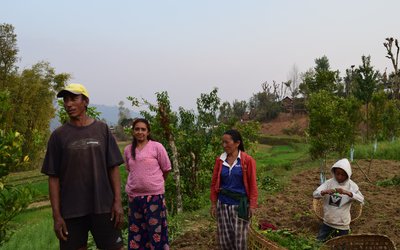Jonathan Larson once said, “The opposite of war is not peace, its creation.” These words capture the essence of the poem “There Will Come Soft Rains” by Sara Teasdale.
In the poem, Teasdale uses imagery and personification of the animals to contrast it with human beings and war. She talks about how the activities of nature and humans do not affect each other. She refers to a war, the Great War specifically, that the humans have created.
The title of the poem was adapted by Ray Bradbury in his short story. The poem talks about the beauty of nature, the ugliness of humans and the contrast between the two.
Teasdale shows the life of nature that “will come” in the future by describing elements from the spring season and appealing to the reader’s senses. She uses words such as “soft rains,” “shallows,” “shimmering,” “singing,” and “whistling” to show the carefree and dreamlike atmosphere of the spring that is to arrive.
While describing the nature, she refers to the senses of a living being, giving nature life and meaning. With words like “smell of the ground,” “shallows circling,” “shimmering sound,” “Robins will wear,” and “whistling their whims”, Teasdale personifies nature to give it a human-like approach. With these words, she specifies the smell, movement and sound that nature embraces. However, as she mentions human beings, the tone of the poem changes dramatically.
As the poem starts to describe humanity and war, the jolly mood changes into a serious one. “Robins…whistling…on a low fence-wire” are the first words that show the presence of humankind in nature. Fence-wires have pointy needles on them, which shows humans’ constant paranoia as they try to protect themselves from danger.
Teasdale describes how desperately humans have drowned in their fear to fail that when war breaks out, “not one will know of the war, not one will care.” These words suggest that humans are self-destructive and will one day destroy themselves with their lack of understanding, but “Spring herself…Would scarcely known that we are gone.”
Through these words, Teasdale shows the sharp contrast between mankind and nature. Firstly, she capitalizes “Spring” and refers to it as a person: “herself”, whereas, she does not bother capitalizing “mankind.” This shows her preference towards nature over humanity. Additionally, she categorizes nature and people into two distinctive groups, though humans count themselves as an evolvement from nature. She furthers this idea when she states how the destruction of humanity through war will not affect nature. Thirdly, the season of spring builds and creates, while war that humans have created destroys and kills. Teasdale gives the human-like characteristics to the nature, as oppose to the humans, to show that humans have lost their human-like qualities by destroying themselves through war. These examples show clear contrast between nature and humans.
In conclusion, “There Will Come Soft Rains” by Sara Teasdale is a poem about the numerous differences between nature and humanity. She uses beautiful, lively words to describe nature, but contrasting words to describe humanity. Sara Teasdale wrote this poem during the Great War. Through this poem, she points out to the world that war is unnecessary and will only result to its separation from nature.
- Highlights of KUSL’s Launching Ceremony
- Aug 17, 2014
- Labour Force Leaving The Country
- Mar 24, 2014
- Thinking about Nepal’s Think Tanks
- Nov 10, 2013
- The five years’ BBM-LLB Course of the Kathmandu University Law School
- Sep 13, 2013
- JUDICIARY: Judging Judges
- Aug 30, 2013

















